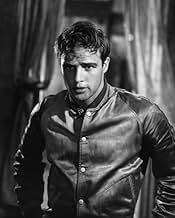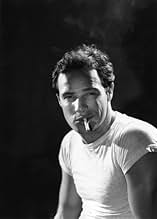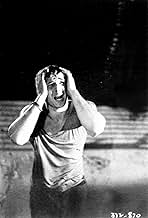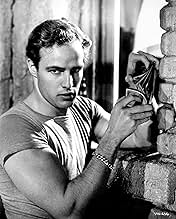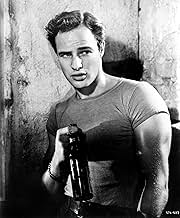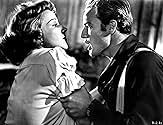Die verwirrte Blanche DuBois zieht in New Orleans bei ihrer Schwester ein und wird von ihrem brutalen Schwager traktiert, während die Realität um sie herum zerfällt.Die verwirrte Blanche DuBois zieht in New Orleans bei ihrer Schwester ein und wird von ihrem brutalen Schwager traktiert, während die Realität um sie herum zerfällt.Die verwirrte Blanche DuBois zieht in New Orleans bei ihrer Schwester ein und wird von ihrem brutalen Schwager traktiert, während die Realität um sie herum zerfällt.
- 4 Oscars gewonnen
- 22 Gewinne & 15 Nominierungen insgesamt
James Adamson
- Extra
- (Nicht genannt)
Irene Allen
- Extra
- (Nicht genannt)
Mel Archer
- Foreman
- (Nicht genannt)
Walter Bacon
- Club Patron
- (Nicht genannt)
Dahn Ben Amotz
- Minor Role
- (Nicht genannt)
Empfohlene Bewertungen
10JFHunt
I often asked myself this question with mixed responses. Did Brando make Streetcar great? Or was he just great in it?
Vivien Leigh is simply haunting and never not shocking. There is more going on there than just a performance. She appears out of herself and hovering ever so softly above. As for the rumored mental illnesses, I can only speculate. I do know for sure that her visualization of Blanche DuBois is the single best performance by an actress I've seen. Well that might not mean much, but I've seen a lot of movies.
Brando made On the Waterfront a classic, but Leigh made Streetcar unforgettable. I always felt like it was a continuation from her most timeless role as Scarlett O'Hara in Gone with the Wind. Like what would have happened to Scarlett, if she was allowed to grow old. Maybe I'm just crazy. But I think the billing says it all; Vivien Leigh, Marlon Brando, Kim Hunter, Karl Malden. I don't think you could dream up a finer cast. Brando might have been the sexiest thing alive, but it's obvious that Leigh made this film great with some memorable help from some movie icons.
Brando may have sent an Indian to receive his second Oscar, but Leigh used her second as a doorstop to her bathroom.
Vivien Leigh is simply haunting and never not shocking. There is more going on there than just a performance. She appears out of herself and hovering ever so softly above. As for the rumored mental illnesses, I can only speculate. I do know for sure that her visualization of Blanche DuBois is the single best performance by an actress I've seen. Well that might not mean much, but I've seen a lot of movies.
Brando made On the Waterfront a classic, but Leigh made Streetcar unforgettable. I always felt like it was a continuation from her most timeless role as Scarlett O'Hara in Gone with the Wind. Like what would have happened to Scarlett, if she was allowed to grow old. Maybe I'm just crazy. But I think the billing says it all; Vivien Leigh, Marlon Brando, Kim Hunter, Karl Malden. I don't think you could dream up a finer cast. Brando might have been the sexiest thing alive, but it's obvious that Leigh made this film great with some memorable help from some movie icons.
Brando may have sent an Indian to receive his second Oscar, but Leigh used her second as a doorstop to her bathroom.
... of two powerhouse juggernauts. Absolutely dripping with tension, acrimony and bitterness as Blanche DuBois and Stanley Kowalski lock horns in their own uniquely individual way with the backdrop a dark, drenched and run down part of New Orleans. Coupled with a pair of superb supporting performances that amplify and escalate the whole to a unique plateau, you'll feel as though you've been run down by an out of control steam train, flattened by a steamroller to be reformed in a furnace fuelled by fear, frustration and desire.
10Rathko
There is little to be said about this movie that thousands of critics have not stated already. It is a magnificent piece of cinema, with an intricate script delivered by actors at the peak of their talents. Leigh is unbearably brittle and fragile and she dances precariously on the edge of sanity. Marlon Brando embodies a sense of brooding masculinity that other men can only dream of attaining, while creating an enduring cinema icon and delivering one of the all-time great movie lines. From the raucous jazz score to the sleazy production design bathed in smoldering grey, 'Streetcar' is a class-act from beginning to end; sexy, brutal, and endlessly fascinating.
With a screenplay by Tennessee Williams, direction from Elia Kazan and quite possibly the greatest performance ever in Vivien Leigh's Blanche DuBois- you can't go wrong.
This movie is dark, gritty and, at times, disturbing in its portrayals of domestic abuse and mental illness. It's astonishing how much of a punch this movie still has after all these years. This just goes to show what a true genius Tennessee Williams really was. The characters he wrote, with all their own complexities and contradictions, and the script with its haunting poetry and now iconic lines are all classic.
But what good is a great script without great actors? Well, luckily, the cast couldn't have been better. Here we have a young Marlon Brando as the brutish Stanley Kowalski, who is truly ferocious in the role. We then have Kim Hunter who gives a great performance as the weak-willed Stella. Stella is the most likeable character in the movie for all she wants is for everyone to get along. Karl Malden is equally great as Mitch, who is seemingly weak and simple and serves as a contrast to Stanley's brutality. Then we have Vivien Leigh as Blanche DuBois. As I said above, I believe Leigh's performance here to be the greatest ever to be committed to film and here's why- Blanche DuBois is probably one of the most complicated characters ever written. She's a compulsive liar, who lives in a world of her own, choosing to create her own reality rather than acknowledge her bleak surroundings. She's a snob, a hypocrite and a user but at the same time she's an underdog who's had a tough life and just wants to be loved. Tennessee Williams himself said of Vivien's performance that 'she brought everything I intended to the role and even much more than I had dared dream of' which pretty much sums up her performance here. She truly gives herself to the darkness of Blanche DuBois, she's unpredictable, tormented and haunting while still somehow sympathetic. Through Leigh's mastery of her character we see that Blanche is really just a daffodil in a windstorm rather than a bad person. Every time I watch this film I notice a new nuance in her performance, whether it's a look in her eye that I hadn't noticed before or a change in her voice as Blanche lets her mask slip- never has there been such a true embodiment of a character.
So all this considered, with Kazan's brilliant direction, great cinematography and the unique "jazzy" score, is why I consider 'A Streetcar Named Desire' one of the greatest films ever made. It's not a film for everyone- it's heavy from the start, it's quite talky and most of the film takes place within the Kowalski's apartment but if you want a movie with brilliant acting and a dark, poetic script then there's no better film than this.
This movie is dark, gritty and, at times, disturbing in its portrayals of domestic abuse and mental illness. It's astonishing how much of a punch this movie still has after all these years. This just goes to show what a true genius Tennessee Williams really was. The characters he wrote, with all their own complexities and contradictions, and the script with its haunting poetry and now iconic lines are all classic.
But what good is a great script without great actors? Well, luckily, the cast couldn't have been better. Here we have a young Marlon Brando as the brutish Stanley Kowalski, who is truly ferocious in the role. We then have Kim Hunter who gives a great performance as the weak-willed Stella. Stella is the most likeable character in the movie for all she wants is for everyone to get along. Karl Malden is equally great as Mitch, who is seemingly weak and simple and serves as a contrast to Stanley's brutality. Then we have Vivien Leigh as Blanche DuBois. As I said above, I believe Leigh's performance here to be the greatest ever to be committed to film and here's why- Blanche DuBois is probably one of the most complicated characters ever written. She's a compulsive liar, who lives in a world of her own, choosing to create her own reality rather than acknowledge her bleak surroundings. She's a snob, a hypocrite and a user but at the same time she's an underdog who's had a tough life and just wants to be loved. Tennessee Williams himself said of Vivien's performance that 'she brought everything I intended to the role and even much more than I had dared dream of' which pretty much sums up her performance here. She truly gives herself to the darkness of Blanche DuBois, she's unpredictable, tormented and haunting while still somehow sympathetic. Through Leigh's mastery of her character we see that Blanche is really just a daffodil in a windstorm rather than a bad person. Every time I watch this film I notice a new nuance in her performance, whether it's a look in her eye that I hadn't noticed before or a change in her voice as Blanche lets her mask slip- never has there been such a true embodiment of a character.
So all this considered, with Kazan's brilliant direction, great cinematography and the unique "jazzy" score, is why I consider 'A Streetcar Named Desire' one of the greatest films ever made. It's not a film for everyone- it's heavy from the start, it's quite talky and most of the film takes place within the Kowalski's apartment but if you want a movie with brilliant acting and a dark, poetic script then there's no better film than this.
Blanche DuBois reminds me of Norma Desmond in Sunset Blvd. (1950). Both characters succumb to their alter egos, and descend into their own worlds of fantasy and half-truths.
In "A Streetcar Named Desire", Blanche travels from her antebellum roots in Mississippi to New Orleans, to see her sister Stella. But, upon arriving in the Big Easy, Blanche must confront Stella's husband Stanley, a greasy, poker-playing neanderthal lout who knows a thing or two about reality. It's the clash between Blanche's stately delusions and Stanley's gritty realism that soups up the drama in this Tennessee Williams play, converted to film classic by director Elia Kazan.
The drama is absorbing. But the performances of Marlon Brando and Vivien Leigh, as Stanley and Blanche, are what make the film the cinematic powerhouse that it is. Excellent B&W lighting and jazzy background music amplify the seedy, sleazy atmosphere, which adds depth and texture to the story and the acting. And, of course, the claustrophobic, steamy French Quarter makes a perfect setting.
As one would expect for a film derived from a play, "A Streetcar Named Desire" is very talky. Generally, I don't care for films burdened with a ten thousand page script. But this talk-fest is an exception. Overwhelming what I would otherwise consider a weakness, the acting of Brando and Leigh alone are enough to justify a two hour investment, and render an enjoyable and memorable cinematic experience.
In "A Streetcar Named Desire", Blanche travels from her antebellum roots in Mississippi to New Orleans, to see her sister Stella. But, upon arriving in the Big Easy, Blanche must confront Stella's husband Stanley, a greasy, poker-playing neanderthal lout who knows a thing or two about reality. It's the clash between Blanche's stately delusions and Stanley's gritty realism that soups up the drama in this Tennessee Williams play, converted to film classic by director Elia Kazan.
The drama is absorbing. But the performances of Marlon Brando and Vivien Leigh, as Stanley and Blanche, are what make the film the cinematic powerhouse that it is. Excellent B&W lighting and jazzy background music amplify the seedy, sleazy atmosphere, which adds depth and texture to the story and the acting. And, of course, the claustrophobic, steamy French Quarter makes a perfect setting.
As one would expect for a film derived from a play, "A Streetcar Named Desire" is very talky. Generally, I don't care for films burdened with a ten thousand page script. But this talk-fest is an exception. Overwhelming what I would otherwise consider a weakness, the acting of Brando and Leigh alone are enough to justify a two hour investment, and render an enjoyable and memorable cinematic experience.
Wusstest du schon
- WissenswertesAs the film progresses, the set of the Kowalski apartment actually gets smaller to heighten the suggestion of Blanche's increasing claustrophobia.
- PatzerWhen Stanley comes back from taking Stella to the hospital, he is looking for a bottle opener. He finds it on the mantelpiece, shakes up a bottle of beer, and opens it. The beer foams up and spills on his trousers. But if you watch at the moment when he swings himself up to sit on the table - before he opens the bottle - you can see that the front of his trousers are already wet. Apparently they re-shot it without him changing into dry trousers.
- Alternative VersionenThe scene in which Blanche and Stanley first meet was edited a bit to take out some of the sexual tension that both had towards each other when the film was first released in 1951. In 1993, this footage was restored in the "Original Director's Version" of the film. The three minutes of newly-added footage sticks out from the rest of the film because Warner Brothers did not bother to restore these extra film elements along with the rest of the movie, leaving them very scratchy due to deterioration.
- VerbindungenEdited into Elia Kazan, vom Outsider zum Oscarpreisträger (2018)
- SoundtracksIt's Only a Paper Moon
(1933) (uncredited)
Music by Harold Arlen
Lyrics by E.Y. Harburg and Billy Rose
Sung by Vivien Leigh while doing her hair
Top-Auswahl
Melde dich zum Bewerten an und greife auf die Watchlist für personalisierte Empfehlungen zu.
Details
- Erscheinungsdatum
- Herkunftsland
- Sprachen
- Auch bekannt als
- Un tranvía llamado Deseo
- Drehorte
- New Orleans, Louisiana, USA(railway station)
- Produktionsfirmen
- Weitere beteiligte Unternehmen bei IMDbPro anzeigen
Box Office
- Budget
- 1.800.000 $ (geschätzt)
- Weltweiter Bruttoertrag
- 55.437 $
- Laufzeit
- 2 Std. 2 Min.(122 min)
- Farbe
- Seitenverhältnis
- 1.37 : 1
Zu dieser Seite beitragen
Bearbeitung vorschlagen oder fehlenden Inhalt hinzufügen







